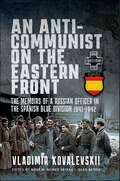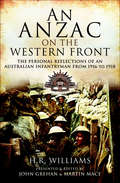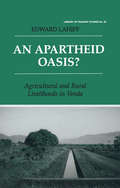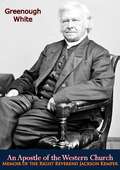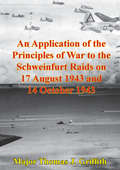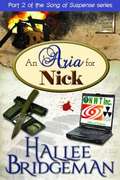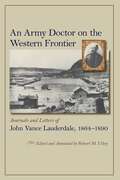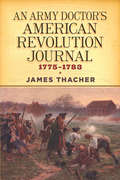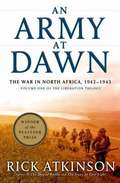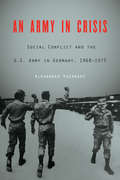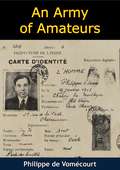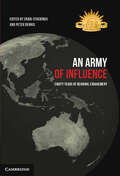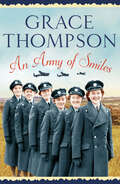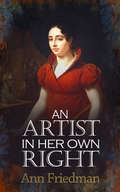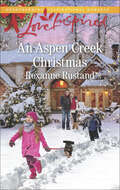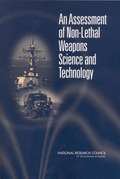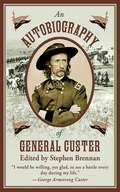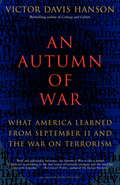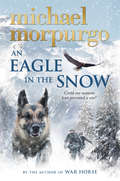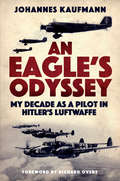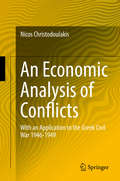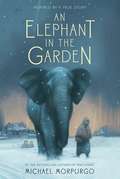- Table View
- List View
An Anti-Communist on the Eastern Front: The Memoirs of a Russian Officer in the Spanish Blue Division 1941-1942
by Vladimir KovalevskiVladimir Kovalevskii’s memoirs record in graphic detail a remarkable military career. As a soldier, a committed anti-communist and Russian patriot he saw from the inside a series of conflicts that ravaged Europe in the first half of the twentieth century. In the First World War he fought the Germans, as a White Russian he opposed the Bolsheviks. He joined the French Foreign Legion and served in Africa before fighting for Franco in the Spanish Civil War and for Hitler in the Spanish Blue Division on the Eastern Front in the Second World War. His memoirs give a vivid insight into the armies he fought with and the causes he fought for – and they show how eventually the mental toll became so great that he was devoured by his own contradictions and the contradictions of his times. His experiences on the Eastern Front during the Second World War were shocking. He hoped the German campaign in the Soviet Union would liberate the Russian people, but after witnessing the grim suffering inflicted on the civilian population by a brutal occupying army he was deeply disillusioned and tormented by a sense of guilt. In the late 1940s, in order to make sense of his life as a soldier and to document the extraordinary sights he’d seen, he wrote these memoirs in Russian. They were buried in an archive for over seventy years, but they have now been edited, annotated and translated for this first English edition.
An Anzac on the Western Front: The Personal Reflections of an Australian Infantryman from 1916 to 1918
by H.R. Williams&“A remarkably candid and graphic account&” of the World War I service of a member of the Australian and New Zealand Army Corps (Britain at War Magazine). Having enlisted in 1915 and serving in the 56th Battalion Australian Imperial Force, Harold Roy Williams arrived in France, from Egypt, on June 30, 1916. He describes the horrors of the Fromelles battlefield in shocking clarity and the conditions the troops had to endure are revealed in disturbing detail. Surviving a later gas attack, Harold Williams&’s subsequent postings read like a tour of the Western Front. Following the Somme, there was the mud and squalor of the line south of Ypres, the German Spring Offensive of 1918, the Battle of Amiens—frequently described as the most decisive battle against the Germans in France and Flanders—the capture of Villers-Bretonneux and, finally, the assault on Péronne. Injured at Péronne and invalided back to the United Kingdom, Williams survived the war to return to Australia in 1919. An Anzac on the Western Front is his vivid description of his service in the First World War—an account that was described as &“the best soldier&’s story . . . yet read in Australia&” when it was first published. &“Williams&’ experience was defined by his rise from private soldier to platoon commander and he confined his writing to it. This is a story of cold, hunger, injury, fear, humour, friendship and death . . . So bloody good.&” —War History Online
An Apartheid Oasis?: Agriculture and Rural Livelihoods in Venda
by Edward LahiffThis is a socio-economic study of agriculture and its contribution to livelihoods in Venda, one of the black "homelands" created in South Africa under apartheid. It is based on a survey of households in the Tshiombo irrigation scheme, a project in central Venda with around 600 plot-holders.
An Apostle of the Western Church: Memoir of the Right Reverend Jackson Kemper
by Greenough WhiteBishop (David) Jackson Kemper (1789-1870) was the first missionary bishop of the Episcopal Church in the United States of America. He was made a deacon of the Episcopal Church in 1811 and was ordained as a priest in 1814. In 1835, the Episcopal Church undertook to consecrate missionary bishops to preach the Gospel west of the settled areas, and Kemper was the first to be chosen. He promptly headed west. Having found that clergy who had lived all their lives in the settled East were slow to respond to his call to join him on the frontier, he determined to recruit priests from among men who were already in the West, and established a college in St. Louis, Missouri, for that purpose. He went on to found Nashotah House and Racine College in Wisconsin, and founded the mission parish that became the Cathedral Church of All Saints in Milwaukee. He constantly urged a more extensive outreach to the Native American peoples, and translations of the Scriptures and the services of the Church into their languages. From 1859 till his death in 1870, he was bishop of Wisconsin.-Print ed.
An Application Of The Principles Of War To The Schweinfurt Raids On 17 August 1943 And 14 October 1943
by Major Thomas J. GriffithThis monograph provides a historical look at the use of daylight precision bombing by American bombers against the ball-bearing factories at Schweinfurt, Germany, on 17 August 1943 and 14 October 1943. The principles of war from AFM 1-1, Basic Aerospace Doctrine of the United States Air Force, are used to analyze the strengths and weaknesses of the American and German efforts during these operations.
An Aria for Nick: Song of Suspense #2
by Hallee BridgemanThe Only Man Who Can Save Her Life Has Been Dead for a Decade. Raised in a loving home, Aria Suarez dreamed of becoming a professional pianist happily married to her high school crush. After the only boy who ever caught her eye dies a hero's death and her wrist is shattered along with her future plans, she turns her brilliant musical mind to nuclear engineering and solving mysteries of science. Abandoned to an abusive father at five, Nick Williams grew up dreaming of escape; of enlisting in the Army and leaving his wretched life behind; of proving himself worthy of the girl he loves. But the crucible of combat offers only the escape of death. A decade later, Aria uncovers a nuclear plot that threatens the heart of our very nation. Sinister forces surround and threaten her when, out of nowhere, the man who reportedly died so many years before returns as if from the grave - intent on protecting her. Has God finally joined them together? Or is Aria doomed to mourn Nick twice?
An Army Doctor on the Western Frontier: Journals and Letters of John Vance Lauderdale, 1864-1890
by Robert M. UtleyAssigned to the District of Utah during the Civil War, physician John Vance Lauderdale spent the next twenty-five years on army posts in the American West, serving in California, Arizona, New Mexico, South Dakota, and Texas. Throughout his career he kept a detailed journal and sent long letters home to his sister in upstate New York. This selection of Lauderdale&’s writings, edited and annotated by a premier historian of the American West, offers an insightful account of army life that will teach readers much about the settlement and growth of the West in a time of rapid change.Lauderdale&’s observations are keen and critical. He writes about fellow officers, his army superiors, the civilians and American Indians he encountered, life on officers&’ row, and the day-to-day functioning of the army medical service. Particularly valuable are his insights into military interactions with local communities of Mormons, American Indians, and Hispanos.
An Army Doctor's American Revolution Journal, 1775–1783 (Dover Military History, Weapons, Armor)
by James ThacherAt the age of 21, James Thacher (1754–1844) joined the newly formed American army as a surgeon's mate, eventually advancing to the role of surgeon for the Massachusetts 16th Regiment. In 1823, he published his Journal, reporting both wartime events he witnessed and those he heard about during his service. One of the most valuable and entertaining accounts to have survived the Revolution, Thacher's diary vividly conveys the tumultuous spirit of the era.Thacher's eyewitness reports include the siege of Boston, the hanging of British major John André, and the momentous defeats of the British Army at Saratoga and Yorktown. His direct and vivid observations range from parties where he and his fellow officers were handsomely entertained by supporters of the new nation's army to hardscrabble days when there was little to eat and nowhere to keep warm. With its cogent overview of the war's major campaigns and battles, its insights into the character of Revolutionary leaders, and its firsthand views of the daily life of a Continental Army officer, the Journal provides a heightened sense of the drama and excitement of the Revolution.
An Army at Dawn: The War in North Africa, 1942-1943 (Liberation Trilogy #1)
by Rick AtkinsonThe liberation of Europe and the destruction of the Third Reich is a story of courage and enduring triumph, of calamity and miscalculation. In this first volume of the Liberation Trilogy, Rick Atkinson shows why no modern reader can understand the ultimate victory of the Allied powers without a grasp of the great drama that unfolded in North Africa in 1942 and 1943. That first year of the Allied war was a pivotal point in American history, the moment when the United States began to act like a great power.<P><P> Beginning with the daring amphibious invasion in November 1942, An Army at Dawn follows the American and British armies as they fight the French in Morocco and Algeria, and then take on the Germans and Italians in Tunisia. Battle by battle, an inexperienced and sometimes poorly led army gradually becomes a superb fighting force. Central to the tale are the extraordinary but fallible commanders who come to dominate the battlefield: Eisenhower, Patton, Bradley, Montgomery, and Rommel.<P> Brilliantly researched, rich with new material and vivid insights, Atkinson's narrative provides the definitive history of the war in North Africa.<P> Pulitzer Prize Winner
An Army in Crisis: Social Conflict and the U.S. Army in Germany, 1968–1975
by Alexander VazanskyFollowing the decision to maintain 250,000 U.S. troops in Germany after the Allied victory in 1945, the U.S. Army had, for the most part, been a model of what a peacetime occupying army stationed in an ally’s country should be. The army had initially benefited from the positive results of U.S. foreign policy toward West Germany and the deference of the Federal Republic toward it, establishing cordial and even friendly relations with German society. By 1968, however, the disciplined military of the Allies had been replaced with rundown barracks and shabby-looking GIs, and U.S. bases in Germany had become a symbol of the army’s greatest crisis, a crisis that threatened the army’s very existence. In An Army in Crisis Alexander Vazansky analyzes the social crisis that developed among the U.S. Army forces stationed in Germany between 1968 and 1975. This crisis was the result of shifting deployment patterns across the world during the Vietnam War; changing social and political realities of life in postwar Germany and Europe; and racial tensions, drug use, dissent, and insubordination within the U.S. Army itself, influenced by the civil rights movement, the Vietnam War, and the youth movement in the States. With particular attention to 1968, An Army in Crisis examines the changing relationships between American and German soldiers, from German deference to familiarity and fraternization, and the effects that a prolonged military presence in Germany had on American military personnel, their dependents, and the lives of Germans. Vazansky presents an innovative study of opposition and resistance within the ranks, affected by the Vietnam War and the limitations of personal freedom among the military during this era.
An Army of Amateurs
by Philippe De VomécourtThis book is the fascinating firsthand account of SOE agent Philippe Vomécourt's wartime experiences and records the heroic efforts in the French resistance in Nazi-dominated France."Many books dealing with the work of the French Resistance have been published on this side of the Channel. Most of them have been the personal stories of gallant men and women, illuminating that corner of the picture that they saw. Here in Monsieur de Vomécourt's book is a wider frame of reference which enables us to see how the spirit and forces of Resistance grew in France first into a gadfly nuisance and ultimately into a serious threat to German security. It shows, too, what it meant to be a member of the Resistance, and what it cost in blood and tears.Monsieur de Vomécourt is in a good position to tell this story. He was in at the beginning in June 1940 with his brothers. Indeed, they can fairly claim to have been the first organizers and leaders, and Monsieur de Vomécourt tells a truly remarkable story.
An Army of Influence: Eighty Years of Regional Engagement
by Peter Dennis Craig StockingsThe importance of regional cooperation is becoming more apparent as the world moves into the third decade of the 21st century. An Army of Influence is a thought-provoking analysis of the Australian Army's capacity to change, with a particular focus on the Asia-Pacific region. Written by highly regarded historians, strategists and practitioners, this book examines the Australian Army's influence abroad and the lessons it has learnt from its engagement across the Asia-Pacific region. It also explores the challenges facing the Australian Army in the future and provides principles to guide operational, administrative and modernisation planning. Containing full-colour maps and images, An Army of Influence will be of interest to both the wider defence community and general readers. It underscores the importance of maintaining an ongoing presence in the region and engages with history to address the issues facing the Army both now and into the future.
An Army of Smiles
by Grace ThompsonThree girls go to war and find true friendship in this Second World War saga from the popular author of the Holidays at Home and Pendragon Island series. Ethel runs away from a violent father, a man so fierce he beat her fiancé senseless. Gorgeous Kate leaves her doting parents and their grocery store. Shy and sheltered Rosie, who has grown up with her grandmother, decides to escape her sleepy hometown. All three join the NAAFI, determined to do their bit against Hitler. Through the travails of war, they become each other&’s new family. Through desperate love affairs, charming pilots, unplanned pregnancies and postings around war-torn Europe, they resolve to stick together. But will the war tear them apart? And when the fighting draws to an end they realize the world—and their lives—can never be the same again . . .
An Artist in her Own Right
by Ann Marti FriedmanSet in France during the Napoleonic period, this is the story of painter Augustine Dufresne (1789-1842) the wife and widow of artist Antione-Jean Gros, painter of Jaffa.An Artist in Her Own Right explores the journey from Augustine's childhood during the French Revolution, through her artistic training and marriage during the Napoleonic era, and looks at the triumphs and challenges she faced in her life and art during the turbulent years that followed. The novel views this intensely masculine time through a woman's eyes.As little is known about Augustine’s life, this is a fictional biography based on the author's extensive research into the art and artists of the 18th and 19th centuries.
An Artist in her Own Right
by Ann Marti FriedmanSet in France during the Napoleonic period, this is the story of painter Augustine Dufresne (1789-1842) the wife and widow of artist Antione-Jean Gros, painter of Jaffa.An Artist in Her Own Right explores the journey from Augustine's childhood during the French Revolution, through her artistic training and marriage during the Napoleonic era, and looks at the triumphs and challenges she faced in her life and art during the turbulent years that followed. The novel views this intensely masculine time through a woman's eyes.As little is known about Augustine’s life, this is a fictional biography based on the author's extensive research into the art and artists of the 18th and 19th centuries.
An Aspen Creek Christmas: Mistletoe Daddy An Aspen Creek Christmas Yuletide Redemption (Aspen Creek Crossroads #4)
by Roxanne RustandThis Christmas, a young woman opens her home to a pair of orphans—and a surprise second chance at love—in this heartwarming romance.Hannah Dorchester is determined to make a good home for her orphaned niece and nephew. After moving them from Texas to Wisconsin, she’s hoping to give them a happy Christmas. But in all the upheaval, there’s one complication she didn’t count on—their uncle Ethan Williams.Thirteen years ago, Hannah was planning their wedding as he secretly planned his escape—joining the military without even a goodbye. Ethan never meant to break Hannah’s heart, but now the recovering soldier is back. And he wants custody of his late brother’s kids. As they start sharing in the joys of the season, he also wants to show Hannah he’s become a better man.
An Assessment of Non-Lethal Weapons Science and Technology
by Technology Committee for an Assessment of Non-Lethal Weapons ScienceNon-lethal weapons (NLWs) are designed to minimize fatalities and other undesired collateral damage when used. Events of the last few years including the attack on the USS Cole have raised ideas about the role NLWs can play in enhancing support to naval forces. In particular to what extent and in what areas should Department of the Navy (DoN) -sponsored science and technology (S&T) provide a research base for developing NLW capabilities? To assist with this question and to evaluate the current NLWs program, the Joint Non-Lethal Weapons Directorate (JNLWD) and the Office of Naval Research (ONR) requested the National Research Council perform an assessment of NLWs science and technology. The report presents the results of that assessment. It discusses promising NLW S&T areas, development accomplishments and concerns about NLW, and series of recommendations about future NLW development and application.
An Assessment of Undersea Weapons Science and Technology
by Technology Committee for Undersea Weapons ScienceAn Assessment of Undersea Weapons Science and Technology
An Assessment of the International Science and Technology Center: Redirecting Expertise in Weapons of Mass Destruction in the Former Soviet Union
by Office of International AffairsThis report reviews the ISTC's objectives and plans, discussed its activities with U.S. and FSU officials, and met with FSU grant recipients and institute directors. The committee concludes that during its first two years the ISTC was successful and effective in meeting its primary objective, which, in turn, has contributed to the larger goal of diminishing the risk of weapons proliferation. Moreover, the opportunities provided to FSU scientists and engineers do indeed offer meaningful nonweapons-related work, which helps address the demoralization that may otherwise contribute to scientists' being lured into work for unfriendly governments. The committee believes the ISTC has also been successful in addressing its secondary objectives—namely, the solution of national and international technical problems; the support of basic and applied research and technology development for peaceful purposes; and, to a lesser degree, reinforcement of the transition of the FSU to a market-driven economy.
An Autobiography of General Custer
by Stephen BrennanTaken from George Armstrong Custer's own writings, An Autobiography of General Custer is the "true story" of one of the most praised, most despised, but surely most remembered American military heroes. Indeed, few figures in our history were--in their own time, as well as in our own--so wildly cheered and so roundly hated.Custer's narration takes us from just after the Civil War, when, having gained a reputation as a bold and inventive leader of the cavalry, Custer was given command of an expedition to help subjugate the Native Peoples of the Great Plains and to force them onto reservations. His story touches on his own court martial and subsequent reinstatement to command. It ends shortly before he embarks upon the campaign that would eventually lead to the Battle of the Little Bighorn and "Custer's Last Stand." As Custer was unable to write about his most famous battle, the Autobiography concludes with an 1880s newspaper account of an interview with Sitting Bull himself after his escape to Canada, in which the great Chief looks back on the battle and offers his own point of view.In the evenings, on post and during his various leaves, Custer would sit at the dining room table with his beloved wife, Libby, and together they would compose the various stories of his exploits that would eventually become the book My Life on the Plains, which was a bestseller in its time, and from which this autobiography is largely taken.
An Autumn of War: What America Learned from September 11 and the War on Terrorism
by Victor Davis HansonOn September 11, 2001, hours after the terrorist attacks on New York and Washington, the eminent military historian Victor Davis Hanson wrote an article in which he asserted that the United States, like it or not, was now at war and had the moral right to respond with force. An Autumn of War, which opens with that first essay, will stimulate readers across the political spectrum to think more deeply about the attacks, the war, and their lessons for all of us.
An Eagle in the Snow
by Michael MorpurgoEngland, 1940. Barney’s home has been destroyed by bombing, and he and his mother are traveling to the countryside when German planes attack. Their train is forced to take shelter in a tunnel and there, in the darkness, a stranger— a fellow passenger—begins to tell them a story about two young soldiers who came face to face in the previous war. One British, one German. Both lived, but the British soldier was haunted by the encounter once he realized who the German was: the young Adolf Hitler.The British soldier made a moral decision. Was it the right one? Readers can ponder that difficult question for themselves with Michael Morpurgo's latest middle-grade novel An Eagle in the Snow.
An Eagle's Odyssey: My Decade as a Pilot in Hitler's Luftwaffe
by Johannes KaufmannThe first English translation of one German military pilot&’s experience before, during, and after World War II flying for the Third Reich. Johannes Kaufmann&’s career was an exciting one. He may have been an ordinary Luftwaffe pilot but he served during an extraordinary time with distinction. Serving for a decade through both peacetime and wartime, his memoir sheds light on the immense pressures of the job. In this never-before-seen translation of a rare account of life in the Luftwaffe, Kaufmann takes the reader through his time in service, from his involvement in the annexation of the Rhineland, the attack on Poland, fighting against American heavy bombers in the Defense of the Reich campaign. He also covers his role in the battles of Arnhem and the Ardennes, and the D-Day landings, detailing the intricacies of military tactics, flying fighter planes and the challenges of war. His graphic descriptions of being hopelessly lost in thick cloud above the Alps, and of following a line of telegraph poles half-buried in deep snow while searching for a place to land on the Stalingrad front are proof that the enemy was not the only danger he had to face during his long flying career. Kaufmann saw out the war from the early beginnings of German expansion right through to surrender to the British in 1945. An Eagle&’s Odyssey is a compelling and enlightening read, Kaufmann&’s account offers a rarely heard perspective on one of the core experiences of the Second World War.
An Economic Analysis of Conflicts: With an Application to the Greek Civil War 1946-1949
by Nicos ChristodoulakisThis book provides a quantitative framework for the analysis of conflict dynamics and for estimating the economic costs associated with civil wars. The author develops modified Lotka-Volterra equations to model conflict dynamics, to yield realistic representations of battle processes, and to allow us to assess prolonged conflict traps. The economic costs of civil wars are evaluated with the help of two alternative methods: Firstly, the author employs a production function to determine how the destruction of human and physical capital stocks undermines economic growth in the medium term. Secondly, he develops a synthetic control approach, where the cost is obtained as the divergence of actual economic activity from a hypothetical path in the absence of civil war. The difference between the two approaches gives an indication of the adverse externalities impinging upon the economy in the form of institutional destruction. By using detailed time-series regarding battle casualties, local socio-economic indicators, and capital stock destruction during the Greek Civil War (1946-1949), a full-scale application of the above framework is presented and discussed.
An Elephant in the Garden
by Michael MorpurgoLizzie and Karl’s mother is a zoo keeper; the family has become attached to an orphaned elephant named Marlene, who will be destroyed as a precautionary measure so she and the other animals don’t run wild should the zoo be hit by bombs. The family persuades the zoo director to let Marlene stay in their garden instead. When the city is bombed, the family flees with thousands of others, but how can they walk the same route when they have an elephant in tow, and keep themselves safe? Along the way, they meet Peter, a Canadian navigator who risks his own capture to save the family. As Michael Morpurgo writes in an author’s note, An Elephant in the Garden is inspired by historical truths, and by his admiration for elephants, “the noblest and wisest and most sensitive of all creatures.” Here is a story that brings together an unlikely group of survivors whose faith in kindness and love proves the best weapon of all.
